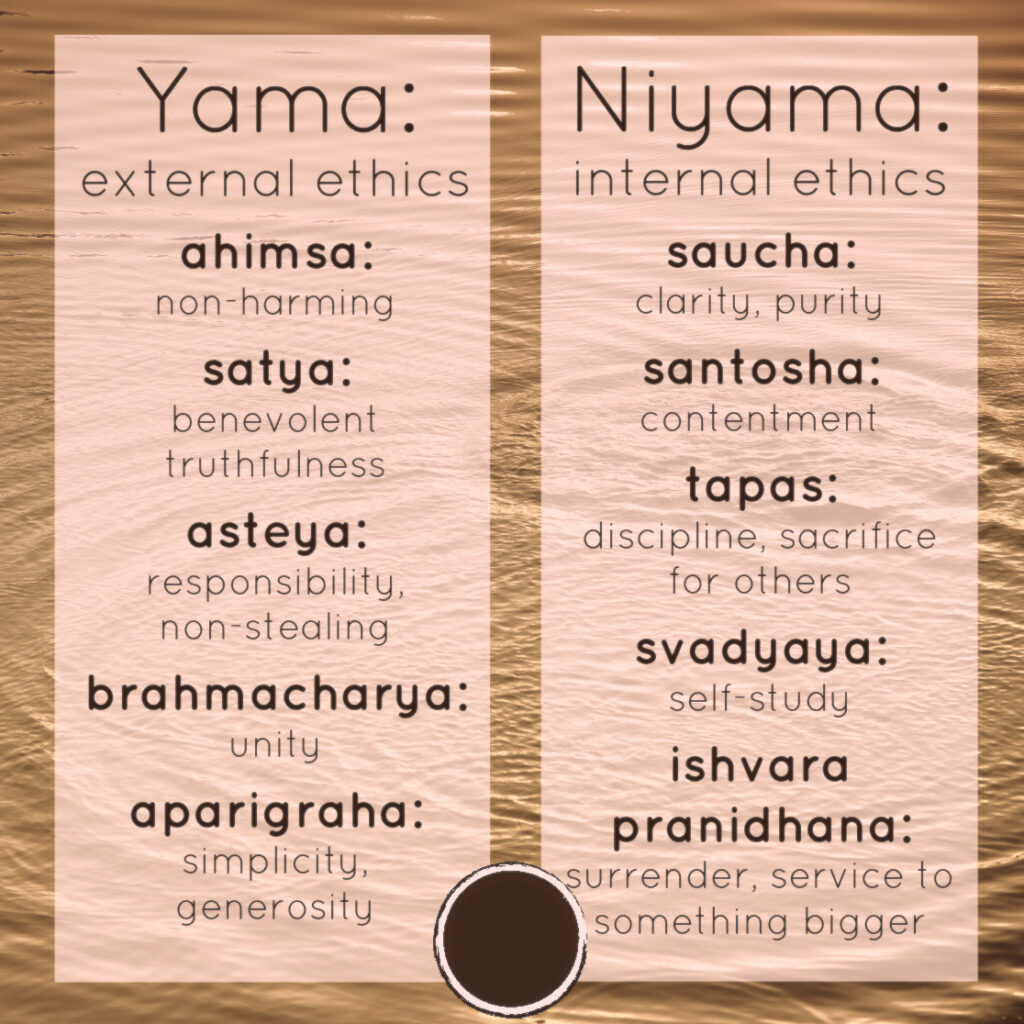The Niyamas – Sutra Study on Nov 22

I am sorry I am late with this post covering our last Yoga Sutra discussion on the first limb of yoga, The Yamas (moral precepts), along with our next assignment for our November 22 meeting on The Niyamas (personal observances). I am sure we all have been a bit distracted by events of the world and of life, so no better time for a discussion of these first two limbs of the practice of Yoga!!
In quick review, The Yamas are the “moral precepts” set out as the first limb of yoga. These are the “Great Vows” of yoga that apply no matter what your place, time, status, or class (as stated in Yoga Sutra II.31). These are UNIVERSAL and the foundation for every other limb that comes after, including our physical practice of asana.
Non-violence, truth, non-stealing, moderation, and non-greed are the five Yamas and when described in The Yoga Sutras, Patanjali gives the “result” of each of these when perfected by a practitioner. And “perfection” means no grey area or wavering in discipline. It is not just “I don’t lie or steal and am a vegetarian” that makes up the Yamas. Every cell and every intention in mind, body, and spirit must become fully integrated with these vows if we seek to reach the goal of yoga. We must be aware and alert at every moment to monitor our actions and reactions to ultimately reap the benefits of The Yamas. A more pure, unfluctuating consciousness develops from following these precepts which then creates a better environment and community with those we come in contact with.
- The YAMAS:
- AHIMSA – Non-violence – aggressive nature is relinquished and even those in your presence cease to be hostile
- SATYA – truth – whatever is said comes to realization
- ASTEYA – non-stealing – all you have is all you need in any moment, so the jewels of gratitude fill you
- BRAHMACHARYA – moderation – knowledge, vigor, valor, and energy flow to you when it is not wasted on frivolous pursuits
- APARIGRAHA – non-greed – the past and future unfold before you when you are not grasping for that which you do not have. The mind is clear and life unfolds without tension or strain.
Our next Yoga Sutra Study Group Meeting is Sunday, November 22nd at 11:00am. The following is our assignment of Sutras covering the NIYAMAS. The niyamas are referred to as “internal personal observances” more than “outward moral precepts”, but as you can see, yoga is a multi-layered and multi-faceted practice that effects us internally and externally at every limb and stage.
II.32 – cleanliness, contentment, religious zeal, self-study and surrender of the self to the Supreme Self or God are the Niyamas
II.40 – Cleanliness of body and mind develops disinterest in contact with others for self-gratification
II.41 – When the body is cleansed, the mind purified and the senses controlled, joyful awareness needed to realize the inner self also comes
II.42 – From contentment and benevolence of consciousness comes supreme happiness
II.43 – Self-discipline burns away impurities and kindles the sparks of divinity
II.44 – Self-study leads towards the realization of God or communion with one’s desired deity
II.45 – Surrender to God brings ultimate freedom
I look forward to these discussions and the insights they bring to practice. As we wind down the year 2020, I look forward to continuing this study with you…there is so much to discover through YOGA!!!